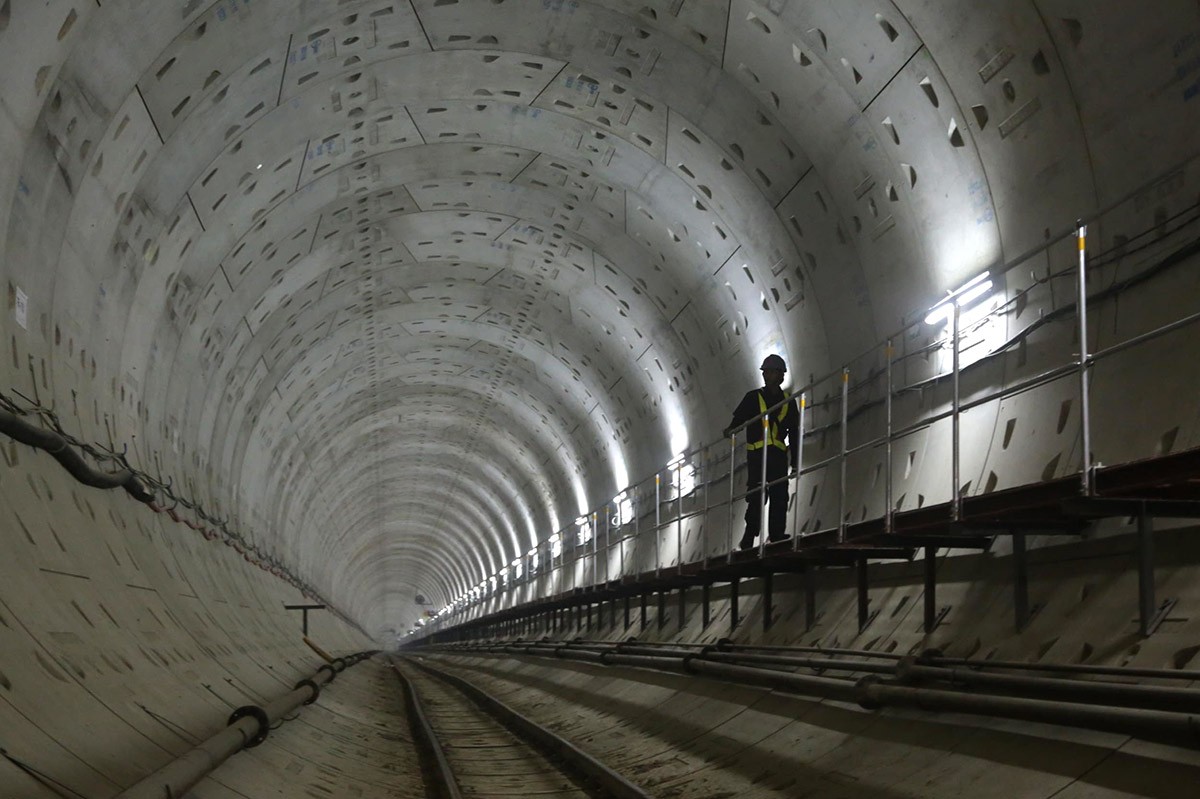Popular Reads
Top Results
Can't find what you're looking for?
View all search resultsPopular Reads
Top Results
Can't find what you're looking for?
View all search resultsJokowi to inspect completed tunnel
Change text size
Gift Premium Articles
to Anyone
P
resident Joko “Jokowi” Widodo is scheduled to inspect the completion of the first phase of the Jakarta MRT North-South Line tunnel, a project of cooperation between the Indonesian and Japanese governments, on Thursday.
Jokowi’s visit will be made following the official visit of Japanese Prime Minister Shinzo Abe to Indonesia on Feb. 15-16, during which both leaders welcomed the steady progress of the project.
The President is going to review the recently laid underground railway tracks through Setiabudi Station on Jl. Jend. Sudirman, Central Jakarta, as well as take a closer look at two of the four tunnel boring machines used to drill the tunnel, Mustika Bumi II and Antareja II.
The Jakarta MRT is one of the major projects the two governments are currently working on, according to Kozo Honsei, the Japanese deputy chief of mission, during his visit to The Jakarta Post on Wednesday.
“This is a symbolic project to us, in terms of our bilateral cooperation and for the Jakarta people,” Honsei said, citing other projects between the two countries, including Patimban Port in Subang, West Java, and the Masela gas block.
(Read also: Jakarta raises tax for properties near MRT project)
“Congestion is known to be a serious problem in Jakarta, and Japanese technology can help modernize the transportation system in order to ease the congestion,” he said. “We know that many Jakartans can’t wait to see the project finished.”
Japan is also behind MRT projects in other major cities in Asia, such as New Delhi, Manila, Bangkok, Hanoi and Ho Chi Minh City.
Japanese and Indonesian technicians have been working together on the MRT construction as part of the knowledge transfer from Japan to Indonesia, he said.
Honsei also discussed the commercial aspects of the MRT stations once the line is operational. “We have prepared some space in Fatmawati and Hotel Indonesia stations to be used as commercial areas,” he said.
The first-phase, stretching 15.7 kilometers from Lebak Bulus, South Jakarta, to the Hotel Indonesia traffic circle in Central Jakarta, is part of the Jakarta MRT North-South Line from Lebak Bulus to Kampung Bandan in North Jakarta with a total length of 23.8 kilometers.
(Read also: Phase I MRT stations to sport distinctive themes)
The construction and engineering of the first stage is estimated to cost over ¥123 billion (US$1.08 billion), of which 54.70 percent is sourced locally.
The North-South Line is expected to accommodate 433,000 passengers per day.
The MRT was initially scheduled to be in operation by 2018 but has been delayed to March 2019.
The project has been delayed mainly by land-acquisition issues with an outstanding 26 land plots in South Jakarta needed for the elevated line. Currently, the project is more than 62.2 percent complete.
PT MRT Jakarta has plans to integrate five of its 13 commuter train stations with the bus stops of city-owned company Transjakarta.
The MRT stations will be located at Lebak Bulus, Blok A, Sisingamangaraja and Dukuh Atas in South Jakarta, as well as at the Hotel Indonesia traffic circle in Central Jakarta.
Honsei said his government had also discussed a proposal to expand the MRT lines with the National Development Planning Agency (Bappenas), in accordance with Japan’s intention to extend the bilateral cooperation utilizing Japanese technology.
Aside from the North-South Line, the project has also blueprinted an East-West Line, stretching 31.7 kilometers between Kalideres, West Jakarta, and Cakung, East Jakarta.
Honsei said the engineering process was underway on the East-West Line with the first stage to connect Kalideres to Cempaka Baru.










